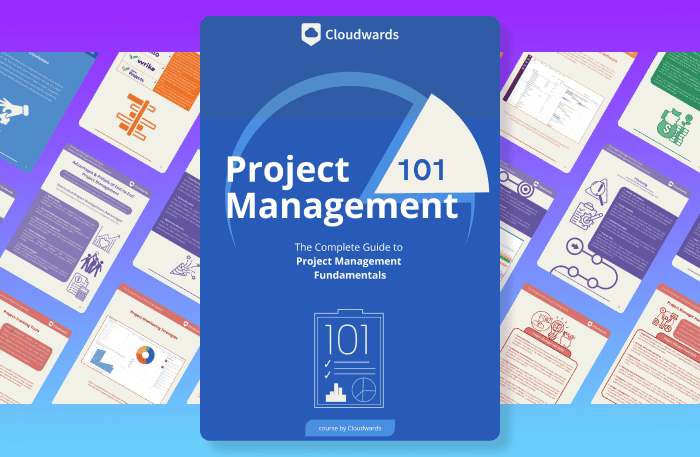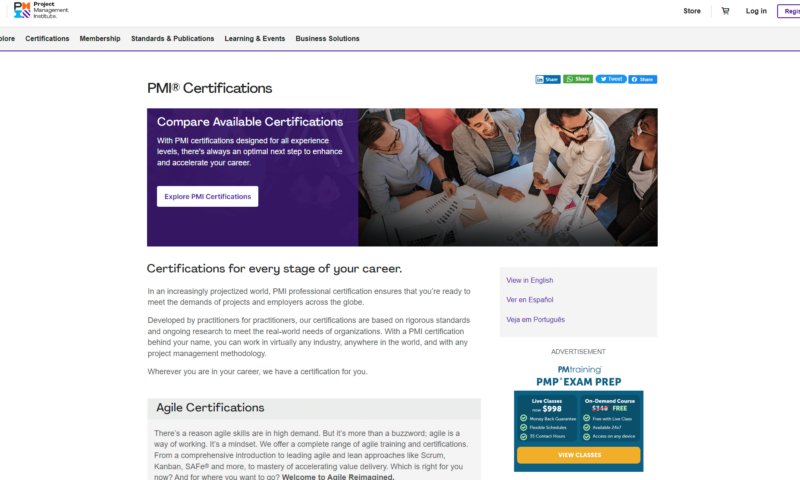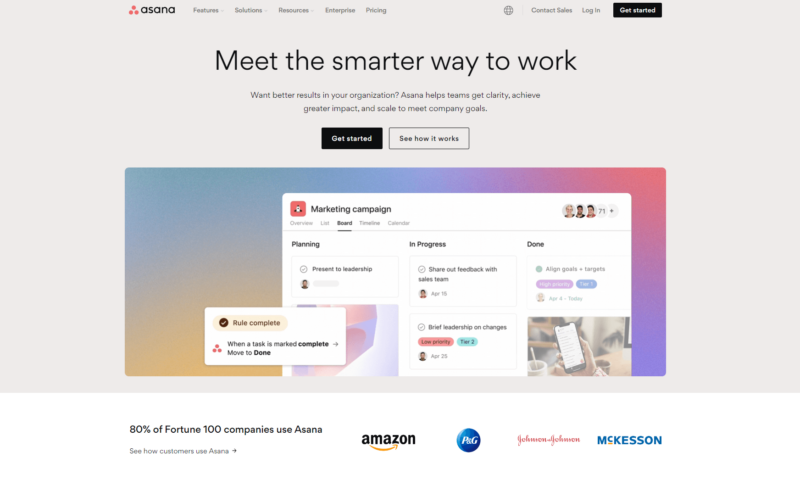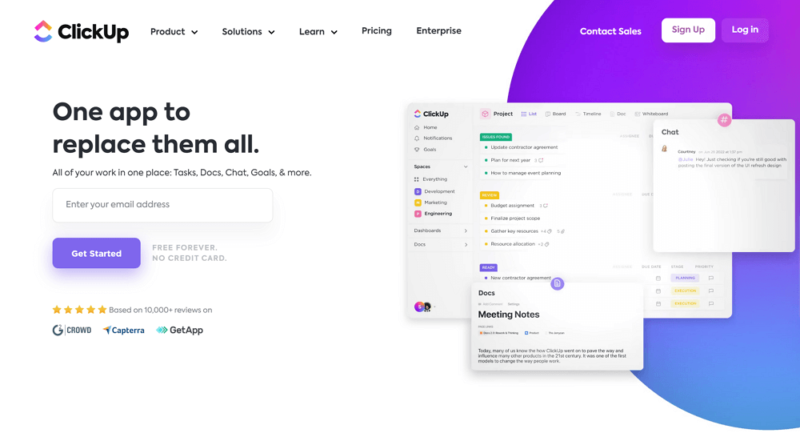How to Become a Freelance Project Manager in 2025: Necessary Skill Set, Finding Potential Clients & More
Freelance work in project management fields has grown in popularity. Thanks to online project management software and collaboration tools, project managers can now work remotely and potentially increase their income. If you’re a project manager and freelancing sounds appealing, our guide on how to become a freelance project manager is for you.
Key Takeaways: Freelance Project Management
- Freelance project managers can set their work hours and locations, choose their clients and potentially make over $90 per hour if they build an excellent reputation.
- There are project management certifications that aspiring project managers can obtain from organizations like the Project Management Institute, the Scrum Alliance, Scrum.org and more.
- Freelancing isn’t easy and requires hard work with long hours, networking, studying, team management and being prepared to shoulder all responsibility for a project.
If you’re an aspiring or corporate project manager who wants to start freelancing, we’ve got good news: plenty of freelance project management opportunities exist with companies that do not employ in-house project managers, but how do you transition to freelance work? That’s what we’ll teach you in our how to become a freelance project manager guide.
Below, we’ll show you that freelancing as a project manager is possible. We’ll inform you of the skills you need, how to get project management certifications, find work and build your portfolio. We’ll even share some of our favorite project management tools for freelancers. We know you’re eager to get started, so let’s jump in.
What Is Freelance Project Management?
Freelance project management is carried out by an individual who is hired or contracted to plan, organize and complete projects for clients and organizations in various industries. These freelance project managers are self-employed and find work through job boards, networks or work agencies.

Why Become a Freelance Project Manager?
A freelance project manager can become financially independent. According to ZipRecruiter, freelance project managers earn $46 per hour on average. Earnings can even reach over $90 per hour. As a freelance worker, you call the shots and get to choose your clients. You can set your work hours and work anywhere. Freelancers can even choose which industries to work in.
Avoid Costly Project Management Mistakes – Get Free Tips Today!

- Discover 10 fundamentals of project management
- Understand step-by-step plans for PM execution
- Learn tips to avoid 5 common mistakes by beginners
What Qualifications & Skills Are Needed for Freelance Project Management?
You’ll need to show that you have qualifications and project management skills before applying for freelance roles. If you’ve worked on a project team or can prove you’re an experienced project manager, that will be invaluable. Project management certifications offered by organizations like the Project Management Institute can also show you have the required skills.

Freelance project managers must show they can handle pressure, communicate effectively and resolve conflict. They must also prove they can budget and understand activity-based costing methods, manage time, work with multiple project management styles, such as Scrum and Kanban and plan for single and multiple projects with various-sized teams or multiple teams.
How to Become a Freelance Project Manager: Tips & Advice
If you’re set on becoming a full-time freelance project manager and dream of managing projects for clients far and wide, this section of hints and tips will help get you where you want to be.
1. Gain Experience and Obtain Certifications
We won’t lie; getting started as a freelance project manager isn’t easy. Before you can jump into a project management position, you’ll need experience. Whether this experience comes from working as part of a project management team and progressing to a project manager role or hitting the books and obtaining certifications is up to you.

knowledge to be a freelance project manager.
If you choose to learn via schooling, you’ll be in good hands. Project management courses will teach you how to handle conflict, manage time, communicate and enhance your planning skills. You’ll also learn about budgeting, avoiding scope creep, how to manage teams and more.
If you’re unsure where to start with certifications, read our roundup of the best project management certifications. If you want to focus purely on Agile project management methodologies, check out our roundup of the best Agile certifications. You can even learn about the best scrum certifications or the SAFe method.
2. Research Industries You Want To Work In
To be successful, you must be familiar with the industries you wish to work in, as each will require different project manager or Scrum Master skill sets. Should you want to work in product or software development, you’ll need to verse yourself with the history of Scrum, what scrum is and all of the meetings and events, like sprint reviews, backlog refinement and sprint retrospectives.

you must learn about work environments.
You’ll need to do the same for other industries such as human resources, creative industries, architecture (here’s a list of the best project management software for architects) and construction industries (check out our roundup of the best software for construction project managers), as well.
While you can learn to work in many industries, picking a niche to specialize in might be better. Specializing will allow you to become a subject matter expert and an authoritative figure in a specific industry.
3. Build A Network
Once you have certifications, job experience or both, and know what industries you’d like to work in, you need to build a network. Networks can help you become established in the project management industry and help you find freelance project manager jobs.

There are several ways you can build a wide-reaching network. You can network in person by attending meetings at your local chamber of commerce or industry-specific expos. Social media platforms, such as LinkedIn and Facebook, are fantastic for networking, thanks to industry-related groups. Don’t be shy. Join them, introduce yourself and share your knowledge.
You must also not forget to create business cards and a website that highlights your skills and achievements. Do these things, and you’ll be on your way.
4. Learn How To Find Work
Finding work can be tricky. However, like networking, you can use sites like Linkedin to find work. You can peruse the job listings or ask your new contacts if they know of any projects that might suit you. There are also job sites like Indeed and Monster.com and freelance job boards like Upwork.

Don’t be afraid to put your business website to use. Share it on social media platforms, in forums and with any organizations you’d like to work with. Plant the “I’m available to work” seed early in your freelance career and watch it grow. Don’t be afraid to use agencies and staffing firms, either. You’ll never know what’s out there if you don’t ask.
5. Build a Portfolio
After you’ve got several projects under your belt, it’s time to build a portfolio. A solid portfolio will showcase your project management experience. Be sure to showcase successful projects you have managed and list the challenges you have faced and how you overcame them.

successful projects from past clients.
In addition to the above, don’t be afraid to show clients projects that forced you to step out of your comfort zone and made you think outside the box to get the project across the finish line. Anyone interested in hiring you will appreciate you showing them your guile and how you deal with adversity. Also, don’t forget to create a digital portfolio on your website.
6. Set Remote Work Boundaries
Remote work can be a blessing and a curse. You can set your working hours and work from the comfort of your home while chatting with clients on Slack (here’s our Slack review). You can also work with some of the best project management software at home. However, you must manage your time correctly, or problems can arise.

Without remote boundaries, you could end up working around the clock. Treat it like any job. Create a schedule that includes 15-minute breaks and lunch periods, and make sure clients know your office hours. You must respect remote work. If you don’t, work can become your life, leading to increased stress, fatigue, low-quality work and unhappiness.
Advantages & Disadvantages of Freelance Project Management
Working as a freelance project manager has its fair share of pros, but there are also cons. Below, we’ll take a quick look at the advantages and disadvantages of working for yourself.
Pros:
- Flexible hours & location
- Diverse work
- Complete control
Cons:
- Inconsistent pay
- No health insurance
- Total responsibility
- Often long work hours
When you work for yourself, you can choose to work from any location. Fancy working at a coffee shop? Go for it. Do you want to work in your comfy pants at home? Knock yourself out. You can even travel and work at the same time if you like. On top of this, you can also set your work hours, which is always a plus.

working alone isn’t always rosy.
When freelancing, you can choose what type of work to take on. You’ll also get to call the big shots alongside your client. As long as you meet your client’s demands, are ethical and have integrity, you can work how you want. Pay-wise, you can set your rates. If you have a proven track record, you can earn plenty. The amount of flexibility when freelancing is extreme.
Then there are the disadvantages. First, cash flow can be tight if there aren’t many available projects or if you get sick and cannot work. So, pay can be inconsistent. You call the shots and are in control. However, this means you’re responsible. Should a project falter, your reputation is on the line.
Freelance work can also mean long, isolated hours. Working alone can have an impact on a person’s mental health.
Best Project Management Software for Freelance Project Managers
You’ve built an extensive networking system and worked on your communications skills, and you’re now ready to join other freelancers in the wild. This is all well and good, but you still need to find the best freelance project management software to use. Don’t worry; we’ve got your back. We’ll show you two of the best options for freelance project managers.
1. Asana

Pros:
- Good free plan
- Multiple styles of work
- Easy to learn and use
Cons:
- Big jumps between paid tiers
- Some big tools are locked behind paywalls
If you’re a freelance project manager looking for software that supports many Agile methodologies and traditional workstyles, Asana should be at the top of your list. Asana frequently makes our project management software roundups, thanks to its user interface, tools and views that are ideal for simple and complex projects. It also has a robust knowledgebase.
One of Asana’s main features is its free plan, which supports 15 team members, unlimited projects, messages, file uploads and more. There are handy mobile apps, templates, support for integrations and automations and strong security protocols. If you’d like to learn more, check out our Asana review, and if you want more pricing information, see our Asana pricing guide.
- Up to 10 users
- Price is per user. unlimited users, expanded features
- Price is per user. unlimited users, even more features
- Custom pricing, advanced security features
2. ClickUp

Pros:
- Vast array of features
- Powerful collaboration tools
- Robust free & paid plans
Cons:
- Clunky interface
- Intense learning curve
ClickUp is a do-it-all project management platform that should not be overlooked, thanks to its kanban boards, Gantt charts, RACI charts, dashboards and collaboration tools. Remote workers will find collaboration tools like mind maps and whiteboards handy. Teams can also create documents in real time. ClickUp offers hundreds of project templates, integrations and more.
ClickUp’s free plan is ideal for small teams as it gives access to many features. The free plan is so good, we included ClickUp in our roundup of the best free project management software. The paid plans are affordable for freelancers, too. You can read more about ClickUp in our ClickUp review and learn about pricing in our ClickUp Pricing guide.
Final Thoughts
If you’re serious about becoming a freelance project management professional, follow the tips in this guide as you embark on your journey. There are many resources to help you make sound decisions regarding certifications, and there are plenty of job boards and agencies that can help you find entry-level project management positions that can give you work experience.
You can also read our guide to the key aspects of project management.
Becoming a freelance project manager isn’t easy, but if you apply yourself, you can have a rewarding career. Are you a freelance project manager? How did you get your start? What certifications do you hold or recommend? What other advice would you offer? Let us know in the comments, and as always, thanks for reading.
FAQ: Become a Freelance Project Manager
Absolutely. If you have previous project management experience or have the required certifications, you can freelance.
According to ZipRecruiter, freelance project managers make $46 per hour, on average. Successful freelancers can demand closer to $90 per hour.
To be a successful freelancer in this field, you’ll need to study, gain certifications from accredited organizations, work hard, gain experience and network.
There are two paths leading to this career. You can gain experience by being a part of a project team and working your way up to the project management level, or you can hit the books and obtain multiple certifications that prove you have the required knowledge and skills to be successful.

